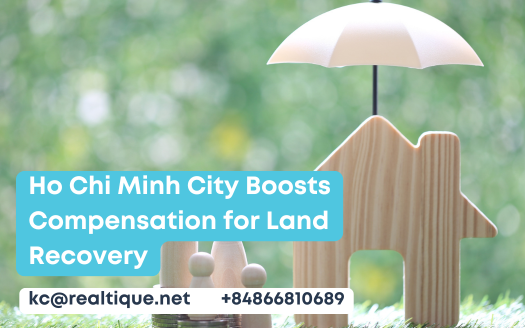Ho Chi Minh City Boosts Compensation for Land Recovery
The recent enhancement of the compensation system for land recovery in Ho Chi Minh City marks a significant shift in how the city approaches the intricacies of urban development and community displacement. By implementing differentiated compensation rates aligned with future land use classifications, the government aims to provide fairer financial support for various types of landowners. In addition, the introduction of structured relocation assistance highlights a commitment to addressing the needs of affected families. However, one must consider the broader implications of these changes on community stability and urban planning in a rapidly changing city. What challenges might arise as this policy unfolds?
Table of Contents
Overview of Ho Chi Minh City's Compensation Regulations
The recent changes in compensation regulations for land recovery in Ho Chi Minh City mark a significant shift in how affected households are recognized and supported.
Effective from September 25 2024, the revised regulations introduce a thorough compensation system for agricultural land being reclaimed, ensuring that households receive housing or land for commercial purposes.
This contrasts with previous regulations under the 2013 Land Law, which primarily focused on compensating families and individuals.
The new criteria establish a more structured approach, differentiating compensation based on the intended future use of the land.
This shift aims to provide equitable support for those impacted, facilitating a smoother transition as land is repurposed for development while acknowledging the rights and needs of displaced residents.
How does the classification of land use impact compensation for agricultural land recovery in Ho Chi Minh City? The classification determines the compensation rates based on the new purpose of the reclaimed land. Agricultural land converted for residential or commercial use will receive compensation reflective of its new classification. This approach guarantees that affected households are compensated fairly, considering the market value of the land at the recovery site. The following table illustrates the key classifications and their corresponding compensation implications:
| Land Use Classification | Compensation Implication |
|---|---|
| Residential | Value based on housing market |
| Commercial | Value based on business usage |
| Agricultural | Value based on agricultural output |
| Industrial | Value based on industrial potential |
| Mixed-use | Value reflecting combined uses |
Relocation Financial Support
Relocation financial support plays an essential role in assisting households affected by agricultural land recovery in Ho Chi Minh City. This support is critical to mitigate the financial burden on those displaced by land reclamation efforts.
Key aspects of the relocation financial support include:
Capped Assistance: Households can receive up to 10 million VND, with potential increases to 20 million VND, depending on circumstances.
Rental Assistance: Monthly rental support is available, not exceeding 24 million VND, to ease the transition.
Additional Funds: Households receiving low compensation may qualify for extra funds to secure new housing.
Flexible Support: Customized assistance for families moving to different areas guarantees specific needs are met.
This diverse financial support structure aims to promote a smoother relocation process for affected families.
Community Impact Analysis
Significant changes in land use due to agricultural land recovery in Ho Chi Minh City have deep implications for local communities.
The conversion of agricultural land to residential and commercial purposes can lead to economic shifts, altering the livelihoods of those dependent on farming. Displacement of residents is a vital concern, as families may find themselves uprooted from their traditional homes and communities.
While the government has introduced compensation measures, the adequacy of these provisions remains a contentious issue, with many households questioning the fairness of valuations.
Community support initiatives are essential to address the negative repercussions of land recovery, ensuring that affected residents receive appropriate assistance and integration into new environments.
Ongoing dialogues with stakeholders will be fundamental to steer through these challenges effectively.
Future Policy Considerations
The ongoing changes in land use resulting from agricultural land recovery in Ho Chi Minh City necessitate careful consideration of future policy directions.
To guarantee effective implementation and community support, policymakers should focus on the following areas:
Enhanced Compensation Structure: Review and adjust compensation rates to reflect current market values and ensure fairness.
Stakeholder Engagement: Encourage dialogue with affected communities to gather feedback and address concerns regarding land recovery processes.
Sustainable Development: Integrate long-term urban planning strategies that balance development needs with agricultural preservation.
Monitoring and Evaluation: Establish mechanisms to assess the impact of land recovery on local communities and adjust policies accordingly.
These considerations will help create a more equitable approach to land use changes while promoting sustainable growth in Ho Chi Minh City.





